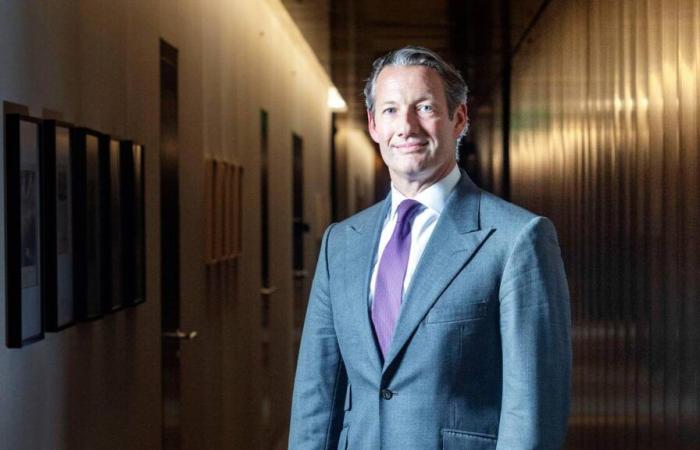Marc Pictet: Geopolitical risks are part of the new normal and I don’t think many countries will emerge as winners. Tensions between China and the United States will continue and we will see “satellite” countries emerge around these two centers of gravity, according to interests which may be changing. Reading geopolitics will only become more difficult. In the Middle East, for example, the ceasefire is fragile, as we can see, and we can also still expect a lot of economic tension. The world will probably be more volatile over the next ten to fifteen years than we have experienced so far.
Switzerland remains the world “leader” in cross-border wealth management, but the next ones, Hong Kong and Singapore, are getting closer. What would losing this first place mean?
I have confidence in the future of the Swiss financial center, otherwise we would not build a new building in Geneva, the Pictet Campus in Rochemont. Switzerland will remain a strong financial center, even if we face considerable challenges. The first of these is that the various political, economic and social actors, on whom the future success of Switzerland depends, dialogue in a spirit of partnership and think together about the best way to make the country prosper. The financial sector represents only 5 to 6% of jobs but 10% of GDP, 12% of tax revenues of public authorities and provides services to businesses. The – very Swiss – attitude of doing our job well while telling ourselves that the rest will follow is perhaps no longer enough; we need to be much more vocal about Switzerland’s strengths.
Comment?
For example, competing countries organize conferences to promote their financial center. I suggested to the new director of Finma the idea of organizing such an event in Switzerland, in collaboration with the State Secretariat for International Financial Questions (SFI) and the Federal Council. Before inventing something new, we could already make it known that we are an open, well-regulated place, with a stable and predictable framework, especially in the current context of social or geopolitical tensions. Even if this does not appear directly in its mandate, Finma could participate in the promotion of the financial center.
Finma would probably respond that it already plays a role in this promotion by ensuring the stability of the financial center, and even by tightening the screw as it has done since the fall of Credit Suisse…
The Swiss financial center is renowned for its seriousness and rigor and it is therefore important that it retains these assets, while knowing how to choose the right directions. All of this must also be implemented and controlled in a reasoned manner. But you have to be careful with the idea of being the best student, as we sometimes hear in Bern. We want a place that is solid and predictable, but also competitive. I’ll give you an example: Basel III. Switzerland will be the only one to be prepared for the finalized system of this banking regulation which will come into force on January 1, 2025. The United States feels little concerned and leans more towards deregulation of the banking world. Regulating can be a good thing, but being the only country to apply it is a risk.
What do you think of the popular initiative for a sustainable Swiss financial center launched on November 26 by economic, political and NGO circles? The text notably wants binding rules like those that exist in London, Hong Kong or Singapore.
I think we must already observe everything that already exists today in terms of sustainable finance in Switzerland, before thinking about new constraints. Switzerland is at the forefront of sustainable finance, and the biggest players will meet in Geneva the week of December 9 for the 5th Building Bridges conference. Most of the players in the market are very involved and it is clear that sustainable finance is one of the areas of development. It is not through such initiatives that we will make the Swiss financial center more sustainable.
What changes have you introduced since becoming a senior partner?
Change is always about the long term at Pictet. We have plans over a five-year horizon, which are a strategic guideline for the entire group. Our 2025 Ambitions include the continued development of our expertise in private assets, particularly in real estate and private equity, with a focus on small European companies. These companies are often under the radar of large investment funds and seek privately held financial partners, closer to them. We wanted this activity to exceed 5% of the group’s revenues and this has now been achieved. Asia is another important axis.
With what ambition?
The objective is for this region to generate more than 15% of the group’s revenues compared to more than 13% currently. Since 2019-2020, we have carried out more than 100 high-value, highly targeted engagements in Asia, involving a total of nearly 600 employees in the region, including Shanghai and Taiwan, where we are active in asset management. Our presence in Asia is not new since we have been present since 1986 in Hong Kong, 1995 in Singapore and even 1981 in Japan. Asian customers are also served by all of the group’s skills centers. Another priority of our strategic plan, we also want to be a benchmark employer to attract and retain talented employees on our 31 sites.
How do you position Zurich in relation to Geneva in the future?
We consider Switzerland as a whole, as a single financial center. Zurich is in a way our second home, we have been present there for 40 years. We are continuing to expand significantly there, but also in Basel and Lausanne, where we are going to double the number of workplaces and create a team to serve the pension funds.
The composition of the college of associates has evolved significantly in recent years, since it is no longer solely composed of white and rather older men. What does this development reflect?
It reflects the extraordinary growth and internationalization that our group has experienced over the last quarter of a century. Among our partners, who stay on average for twenty-one years, the youngest is currently 42 and the oldest 54. It is important that we remain in tune with the outside world and our customers through a diversity of backgrounds, of training, of opinions which has always existed within the college. We can also count on the experience of former partners, all of whom still have an office in our headquarters. My cousin Ivan Pictet reminded me one day that when he started in the early 1970s the bank managed 10 billion and it had lost 50% of these assets following the first oil crash and the abandonment of gold exchange standard. Keeping these events in mind allows you to put things into perspective when the assets under management fall by a few percent.
Is Pictet’s growth fueled in part by former Credit Suisse clients or employees who have joined you?
We have never targeted the employees of a particular establishment and even less tried to take advantage of the difficulties of a competitor. Of course, if customers decide to change, we are open to welcoming them.
The group is therefore getting closer to its customers around the world, which translates into stronger growth outside Switzerland. Is the movement accelerating?
Our roots in Switzerland are still very strong, with around 60% of our 5,500 employees. But growth tends to take place more abroad, in particular because our customers want local service in certain regions of the world. Furthermore, in our export industry, the protectionism that we observe almost everywhere and which tends to strengthen forces us to this rapprochement because serving them from Switzerland is not always possible.
Do you think Switzerland will one day gain access to the European market for financial services?
It seems likely that a framework agreement will be concluded at the end of the year or early 2025; then the democratic process will begin in Switzerland, which will take time, probably until 2026. But access to the financial services market is not part of this package, so additional discussions will be needed on this specific point.
What would a failure of these bilateral IIIs mean for you?
This would be very damaging for Switzerland and also for the financial sector, due to the uncertainty it would create for the entire economy. But I am confident: we will get there as long as politicians, supervisory authorities and umbrella organizations work in partnership, with a common vision. We can clearly improve this aspect. This is all the more important as Switzerland is increasingly attractive in the current very tense geopolitical context. The country is an island of stability and solidity, where institutions function, what’s more with a strong currency. This reassures many wealthy individuals or even institutions seeking to establish themselves in Switzerland for all these reasons.
What impact has the fall of Credit Suisse had on this security image?
This sent shock waves through Switzerland, beyond the financial sector. Some have compared this with Swissair or other emblematic brands of the Swiss economy. Afterwards, if we believe in the market economy, businesses are created, while others disappear. It is part of the life of the economy and of a country. I would like to say here how grateful I am to UBS for taking on the challenge of taking over Credit Suisse, because there were a lot of jobs at stake. Not to mention a tax windfall that benefits taxpayers.
UBS is currently under pressure: from being a savior, the establishment is now seen as too big and carrying risks. Does this change the conditions for you?
We are lucky to have a UBS in Switzerland and my wish would be to have a second institution of this quality. I therefore do not think that UBS is a risk for Switzerland. I hope that the authors of the parliamentary report on Credit Suisse will clearly define the roles and responsibilities. It could indeed be damaging for the future of the Swiss financial center if this report misses the target by addressing other points.
Which ones?
It is imperative to preserve the concept of proportionality. For example, the concept of the “senior manager regime” can make sense for listed companies, by requiring managers to feel more responsible and by establishing measurement criteria for their risk appetite. But it is not, for example, suitable for a group like Pictet, which is owned by seven partners and to a lesser extent 48 senior managers. Our remuneration depends on our profits and all our fortune is invested in the Pictet group. Our clients greatly appreciate the alignment of interests that this represents for them. They also tell us that they like knowing that we are here for the long haul and that we won’t be able to leave with a golden parachute if the ship were to sink.
PROUST QUESTIONNAIRE
A book that left an impression on you?
The book I’m reading today, because it’s always about discovery. This is the “Dream of the Jaguar”.
A way to disconnect?
The mountain and the village of Zermatt.
If you hadn’t been a banker?
I had the vocation, I never imagined doing anything else.
Where would you like to live if you weren’t from Geneva?
In Argentina, my wife’s country.
The talent you wish you had.
To be a musician.
5 DATES
November 16, 1973 Born in Geneva.
1996 Financial analyst, Prudential Investments, Newark (United States).
2001 Joins the Pictet group, becomes partner in 2011.
2020 President of the Foundation for Geneva.
July 2024 Senior associate of the Pictet group.






